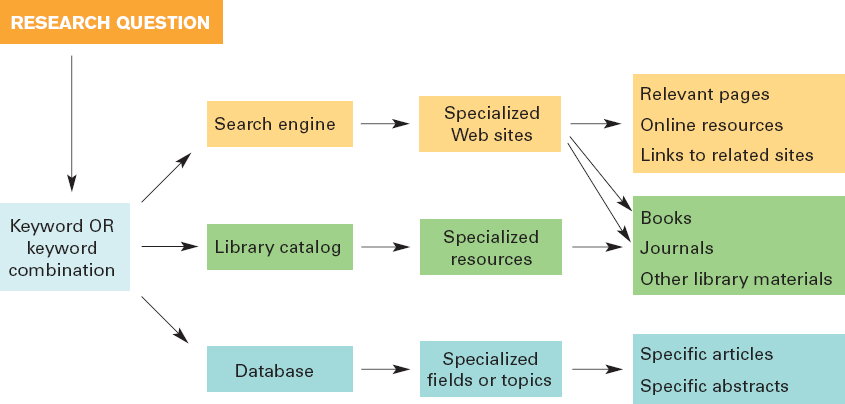Turning a Topic into a Question
As you explore, move from broad to specific by asking more precise questions. Ask exactly what you want to learn; your task will leap into focus.
| BROAD OVERVIEW | Family structures |
| TOPIC | Blended families |
| SPECIFIC QUESTION | How do blended families today differ from those a century ago? |
| BROAD OVERVIEW | Contemporary architecture |
| TOPIC | Landscape architecture |
| SPECIFIC QUESTION | In what ways have the principles of landscape architecture shaped the city’s green design? |
For more on generating ideas, see Ch. 19.
Generate Ideas. Freewrite, map, or brainstorm, and then select a question that appears promising. Your instructor may have suggestions, but you will probably be more motivated investigating a question you choose.
Size Up Your Question. If your question is too broad, you’ll be swamped with information. If it has been overdone, you’ll struggle to sound fresh. Focus to find a workable research question:
- Is it interesting to you? Will your discoveries interest your readers?
- Is it debatable? Does it allow for a range of opinions? Will you be able to support your own view rather than explain what’s generally known and accepted?
- Is it narrow enough for a productive investigation in the few weeks you have? Would a background search supply the vocabulary you need to stick to a single focus?
| BROAD QUESTION | How is the climate of the earth changing? |
| NARROWER QUESTION | How will El Niño affect climate changes in California during the next decade? |
| BROAD QUESTION | Who are the world’s best living storytellers? |
| NARROWER QUESTION | How is Irish step dancing a form of storytelling? |
| BROAD QUESTION | Why are people homeless? |
| NARROWER QUESTION | What housing programs succeed in our region? |
Although you should restrict your topic, a question can be too narrow or too insignificant. If so, it may be difficult to find relevant sources.
| TOO NARROW | How did John F. Kennedy’s maternal grandfather influence the decisions JFK made during his first month as president? |
A question may also be so narrow that it’s uninteresting. Avoid questions that can be answered with a simple yes or no or with a few statistics.
| TOO NARROW | Are there more black students or white students in the entering class this year? |
| BETTER | How does the racial or ethnic diversity of students affect campus relations at our school? |
Shape a question that leads you into the heart of a lively controversy. The best research questions ask about issues and problems that others take seriously and debate, matters of real interest to you and your readers.
Hone Your Question. Make your question specific and simple: identify one thing to find out, not several. The very phrasing of a well-crafted question can suggest keywords — and useful synonyms — for searches.
| QUESTION | What has caused a shortage of affordable housing in northeastern cities? |
| POSSIBLE SEARCH TERMS | Housing shortage, affordable urban housing |
Refine Your Question. Until you start your research, you can’t know how fruitful your first question will be. At least it establishes a starting point. If it doesn’t lead you to definite facts or reliable opinions, if it doesn’t start you thinking critically, reword it or throw it out and ask a new question.
RESEARCH CHECKLIST
Questioning Your Question
- Does your question probe an issue that engages you personally?
- Is its scope appropriate — neither huge nor puny? Will you be able to answer it given the time and length limits for your paper?
- Can you find both current and background information about it?
- Have you worded your question concretely and specifically, so that it states exactly what you are looking for?
See more on stating and using a thesis.
Predict an Answer in a Working Thesis. Some writers find a project easier to tackle if they have in mind not only a question but also a possible answer, even a working thesis. However, be flexible, ready to change either answer or question as your research progresses.
| RESEARCH QUESTION | How does a nutritious lunch benefit students? |
| WORKING THESIS | Nutritious school lunches can improve students’ classroom performance. |
Use Your Working Thesis to Guide Your Research. You probably will revise or replace your working thesis before you finish, but it can guide you now.
- Identify terms to define and subtopics or components to explore.
- List or informally outline points you might develop.
- Note opposing views, alternatives, or solutions likely to emerge.
This early exploration will help you pursue the sources and information you need but avoid any wild goose chase that might distract you.
However, if all you find is support for what you already think, your working thesis may be too dominant. You may be simply defending your view, not conducting true research. For this reason, some writers delay stating a thesis until they’ve done substantial research or even begun drafting.
